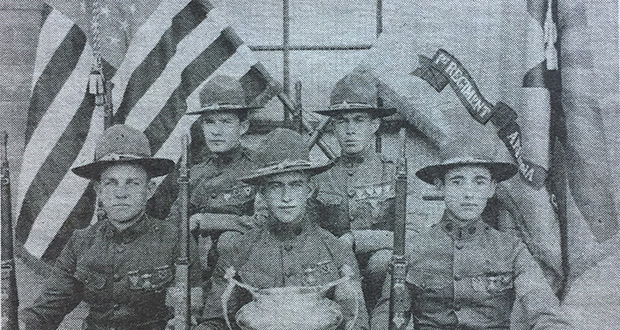Cousin Jacks and Jennies in Arizona
Arizona Capitol Reports Staff//May 26, 2006//[read_meter]
The story of the Cornish in the Untied States is intertwined with the story of the technologically advancing and treacherous Arizona mining industry. Globe was an important mining center and had a large population of Cornish Cousin Jacks, who learned mining from the ground up in the coalmines of Wales. The phrase “Cousin Jacks and Jennies” comes from Cornish families who came to the United States and said of each other, “Yes, that’s my cousin Jack or Jennie.” Resting in the Globe cemetery are Cornish families of Pascoe, Opie, and Trevallian, with many more from Cornwall County in southwestern England. Their names are etched in copper and screwed to their granite headstones.
Many residents left the primarily industrial Cornwall County between 1815 and 1930. In fact, the county lost 20 percent of its adult male population every 10 years during 1861-1901. During the early 19th century, Cornwall had the most modern European mining technology, capital and skilled labor. Cornwall’s skilled labor force followed the county’s export of high-pressure steam engines to South America in 1814, and came with the introduction of the latest mining technology to the Arizona territory.
Cornwall exported everything. Boilers, ropes and crucibles moved along with the labor force to mine, process, organize and administer these enterprises. Mineral strikes at Bisbee and Globe followed. Without the introduction of the Cornish engine, deep lode mining in California after the 1849 gold rush would have been considerably delayed.
Cornish families who went to work at Globe’s Silver King mine in 1875 include Richard Trevathan, George Lobb, and the large John Knight family. Other Cornish miners included Jim Jewell, who ran the tunnel into the Little Raven mine, and John Blewett who leased part of the Rescue Mine. George Millet purchased 200 shares in the Moonlight Mining Company.
The Cornish not only exported their technology but also their culture. In 1898, the first train steamed into Globe carrying Carrie Oates, a Cousin Jennie and stalwart of the Methodist Church. She entertained members with her music when not subjecting them to lectures on “Corrupt Literature” and “Jordan is a Hard Road to Travel.”
Three Cornish men donated money for St. Paul’s Methodist church. Thomas Pascoe gave money to build a parsonage. Several Gila County businesses owe their success to Pascoe’s organizing spirit. He was born in 1846 in Galena, Illinois, to William and Mary Pascoe, natives of Cornwall. The family traveled to California during the gold rush.
After acquiring his education in California public schools, at 22, Thomas Pascoe went to work in the redwood lumber camps. Four years later he turned to ranching, but ultimately moved to Nevada County, where he operated a butcher shop for three years. In January 1881, Pascoe moved to Globe.
As if prospecting and mining were not enough to fill his time, he also became involved in Gila County politics and law enforcement. He served as a Globe constable for one year before being appointed deputy sheriff by his brother, Gila County Sheriff Ben Pascoe. Thomas Pascoe opened the Pascoe Livery Stable in Globe, which stayed in business for 14 years. He also operated a large ranch and fishpond until 1891, when all of his property was destroyed by fire. Afterward he operated a hay and grain business until 1899.
That year Pascoe disposed of all of his other interests in Globe to establish the Globe Water Works System. As the primary stockholder in this company, he supervised the construction of the plant. In a familiar move, he served as the company president for four years and then sold his interest.
Pascoe continued his career by organizing and serving as president of the Miners and Merchants Bank until it was absorbed by the Gila Valley Bank & Trust Company. He also raised cattle on a ranch in the Salt River Valley, but sold that property to the government in 1904, when construction began on Roosevelt Dam. While in retirement, the tireless Pascoe served as president of the Globe Ice and Cold Storage Company.
In 1886, Thomas married a widow, Elsie Nichols, who was born in Scotland and came to America in 1872. She remained a member of the Presbyterian Church while Pascoe was a member of the Methodist Episcopal Church. He was a 32nd degree Mason and served as Eminent Commander of Globe No. 5, Knights Templar.
When the silver pinched out, Globe became a copper town. Globe’s Old Dominion Mine had two Cornish superintendents, Samuel Parnell and Frank Juleff. The “Hoo-Dee,” as the Old Dominion was known to Cousin Jacks, was extremely dangerous, even by early 20th century standards.
In June of 1912, a man died when he fell more than 80 feet down a shaft. In 1890, while grasping for a tool, a man leaped across the four-foot wide shaft as he had so often done in the past. This time the cross bars of the ascending cage carried him through two sets of timbers. His crushed body fell to the bottom of the shaft.
Cornish Cousins Jacks and Jennies contributed much to Arizona’s history and their lives as pioneers were not easy. Despite living tough and often tragic lives, they always seemed to find the courage to persevere and start over.
— Jane Eppinga, photo courtesy of author.
Source: Ephemera Files Arizona Historical Society, Arizona Vol. III, 1916.


















